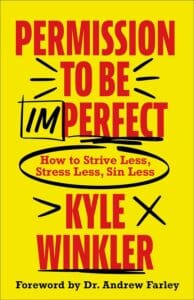- Home
- Spiritual Life
- What Did Jesus Do?

What Did Jesus Do?
 Excerpt taken from Permission to Be Imperfect: How to Strive Less, Stress Less, Sin Less by Kyle Winkler
Excerpt taken from Permission to Be Imperfect: How to Strive Less, Stress Less, Sin Less by Kyle Winkler
Chapter 4
What Did Jesus Do?
“So the Word became human and made his home among us. He was full of unfailing love and faithfulness.” —John 1:14
The possibilities for ministry these days are as exciting as they are endless. In our digital age, we can speak to countless people on the other side of a screen, many of whom would never step foot in a church. Like any convenience, the “other side of a screen” has downsides too, which are not always fun or fruitful. Screens give people a sense of courage to say what they never would in person. With comment boxes below everything on social media, it is too easy for people to speak their minds with no inhibitions.
My content occasionally attracts the scoffs of militant unbelievers. I do not know why they waste the only existence they believe that they have on arguing faith. But I kind of expect antagonizing comments from them. Far more frustrating to me are the armchair theologians who pick apart a 280-character tweet for not mentioning every possible caveat. I especially attract vitriol from these people anytime I mention God’s goodness and love. “But, but, but,” they gush like a goat, followed by their reasons for why my words cannot be true.
One lady was irate over a video I shared about how radically God loves. “Stop commonizing God! He is holy!” she screamed in all caps. (It is human to want to defend yourself. And sometimes I prove myself especially human in that regard. Though, these days, I am better at resisting the immediate impulse to prove them wrong. Instead of responding online, I write books. That is far more satisfying to me.)
Essentially, the lady was angry because I said that God is not angry. I never said that God is not holy. Nor would I ever even hint at that. Undoubtedly, God is holy. But in her mind (and in other minds like hers), His holiness is equated with how strictly He enforces the rules and how enraged He gets when people break them. I get it. I used to believe that way, too. It might be from my upbringing, but the word holy just sounds somber and gloomy to me. There are still times when hearing it triggers a sense of guilt, which I push aside because I know better. The word holy simply means “uncommon.”
Have you discovered yet that being angry is not all that uncommon? I rediscover this almost every day as I brave Interstate 4 in Central Florida, where I live. People are not so kind in the rat race to the House of Mouse (aka Walt Disney World). I am sure drivers are not that different where you live. Wrath and rage are common. What would be uncommon is to love that maniac who cut you off.
Jesus said the same. At the beginning of His ministry, He shocked a Jewish crowd when He equated God’s perfection with unconditional love for everyone. And I do mean shocked. Imagine being one of them. As a Jew, your life revolved around following the Law and all the interpretations of it. You were taught that God demands separation from certain people, such as Samaritans, tax collectors, and lepers. Then one day, in a single talk, this otherworldly, miracle-working rabbi challenges almost everything you know about God. I am describing to you Jesus’ renowned Sermon on the Mount (see Matthew 5).
In the middle of His sermon, Jesus remarked, “You have heard the law that says, ‘Love your neighbor’ and hate your enemy” (verse 43). He was good at baiting their attention like this. In a short time, His disciples learned that His instigating remarks were often followed with a wrecking ball to their worldview. This time was no different. Jesus continued, “But I say, love your enemies! Pray for those who persecute you!” (verse 44). This was radical. Loving people on the far end of the spectrum meant loving everyone, period. He continued to reveal that this is precisely what God does, and it is what makes Him good and perfect. Jesus urged the audience to have the same heart. “Be perfect, even as your Father in heaven is perfect” (verse 48).
To be sure, Jesus did not say all of this to raise the bar with another impossible law to follow. A call to flawlessness was not His point. Like most of His Sermon on the Mount, His words served to confront both their sense of self-righteousness and their idea of who God is. His point was to challenge their idea of perfection by revealing that God’s character is not based on His anger at people for what they do. Rather, His love for people remains despite what they do.
Jesus’ teaching captivated the crowd. He spoke with an authority and wisdom they had never heard. Perhaps more amazing than what He said, however, is who He claimed to be and what He came to do. Different from every other prophet or guru in Israel’s history, Jesus referred to Himself as Lord and made claims as sweeping as coming to fulfill the law of Moses (see Matthew 5:17; 7:21).
Up to this point, the news had spread that Jesus was a miracle worker who had sage advice. That much was apparent. But was there anything more to Him that might prove He was something more? People were stunned by what followed.
Be Healed with Great Mercy
Most in the crowd who followed Jesus down the mountain seemed content to take a wait-and-see approach to His bold assertions. A man with leprosy, however, lunged forward to find out right away. He needed to know if Jesus was who He claimed to be, and if He loved as He claimed to love.
In those days, leprosy was a shameful disease. Because leprosy was so contagious and painful, a person who suffered with it could not be among uninfected people. The Law dictated that they were unclean and it relegated them to the outskirts of town, isolated from others. People took this so seriously that if anyone approached a leper, the leper needed to shout “unclean” and ring a bell. Imagine the shame.
The leper who thrust himself toward Jesus took a huge risk. If Jesus were not the loving Lord that He illustrated, who knows what punishment the man would have received. But he had to take the chance. “A man with leprosy approached him and knelt before him. ‘Lord,’ the man said, ‘if you are willing, you can heal me and make me clean’” (Matthew 8:2). Jesus did not hesitate to respond. Remarkably, to the man’s bold request, Jesus reached out and touched him. “‘I am willing,’ he said. ‘Be healed!’” (verse 3). The leprosy dissolved immediately.
Though Jesus was already known for performing miracles, this was the first one described in detail in Matthew’s gospel. That is not coincidental. Everything about the encounter details God’s goodness in a way that flies in the face of what people had believed about God. Remember that in the years after the Ten Commandments, religious leaders created many laws beyond the original 613. Yes, God’s Law did instruct that lepers remain isolated from other people (see Leviticus 13:46). This was to preserve the health of the people. But humans took it further. Still many years from a full revelation of good and evil (and many more years from scientific explanations for disease), people interpreted leprosy as one of God’s punishments for sin; therefore, they treated lepers as one of God’s enemies.
When the leprous man knelt before Jesus, the Lord could have offered mercy without touching him. He could have granted compassion without looking into his eyes. Yet Jesus stooped down to meet the man at his level. In doing so, He proved a god-like immortality and immunity to disease. That is notable. To a people who believed that disease is the product of God’s punishment, Jesus’ healing expressed both a willingness and ability to forgive sin. That is huge.
More marvelously, though, Jesus conveyed that God is here among imperfect people to reconcile them with His face. That is a message that He continued with nearly every subsequent healing. But this was only the beginning. Jesus had much more to say through what He did, especially about what it means that God is love.
…
Excerpt from Permission to be Imperfect by Kyle Winkler provided by Chosen Books, a division of Baker Publishing Group. Copyright 2024. Used with permission.
Order your copy of Permission to Be Imperfect: How to Strive Less, Stress Less, Sin Less by Kyle Winkler
Trending Now
Sign up today for your Inspiration Today Daily Newsletter
Supercharge your faith and ignite your spirit. Find hope in God’s word. Receive your Inspiration Today newsletter now!
Kyle Winkler
Kyle Winkler is a practical Bible teacher who equips people to live in victory. His highly acclaimed mobile app, Shut Up, Devil!, ranks as a top Christian app. In addition to being an author, sought-after speaker, and frequent guest on Christian media, Kyle holds an MDiv in biblical studies from Regent University. Learn more at kylewinkler.org
Related Articles
February 26, 2026
Chased by God’s Blessings—How to Attract God’s Blessings and Walk in His Favor
The key to God’s amazing turnaround plan for you to walk in His favor in every area of life. Have…
February 25, 2026
Finish Strong with a Kingdom Mindset
For if you keep silent at this time, relief and deliverance will rise for the Jews from another…
February 23, 2026
The Joy of Being His Workmanship
When life urges us to strive harder and do more, Scripture invites us to rest in a freeing truth:…
February 20, 2026
Stepping Out in Faith When God Calls You to the Impossible
Stepping out in faith often feels uncomfortable—especially when God calls you toward something that…
Next Steps To Strengthen Your Walk
Inspiration Today Newsletter
Supercharge your faith and ignite your spirit. Find hope in God’s word. Receive your Inspiration Today newsletter now!
Christian Articles
Find articles to strengthen your walk and grow your faith. We have a wide range of topics and authors for you.
Submit A Prayer Request
We are here for you. Simply click on the button below to reach us by form, email or phone. Together we will lift our hearts and voices with you in prayer.





